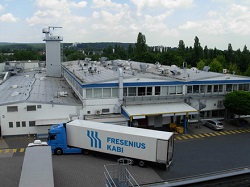 |
| The Fresenius facility in Bad Homburg, Germany--courtesy of Fresenius Kabi |
Planning to expand its production capacity in Russia and the former Soviet Republic, Germany's Fresenius Kabi agreed this year to partner up with Binnopharm, a Moscow-based drugmaker that has two manufacturing facilities making IV drugs, infusion solutions and active pharmaceutical ingredients, not unlike Fresenius. But the political situation in Russia has made that too difficult, so Fresenius and Binnopharm are exploring other ways to work together.
"Changing political and regulatory circumstances in the region have made the closing of the joint venture more challenging than anticipated," the German drugmaker said last week. It said the parties had mutually agreed to terminate the joint venture agreement announced in April 2014. "The company is committed to further grow its business in the region, and is exploring other potential options to cooperate with Binnopharm."
The parties involved were Fresenius and Sistema JSFC and Zenitco Finance Management, both Russian companies. The April deal was for Fresenius to combine its businesses in Russia and the Commonwealth of Independent States (CIS) with Binnopharm, which is a subsidiary of Sistema. Biopharma has more than $100 million in sales and employs 350. Fresenius, which has been doing business in Russia for two decades, was going to own 51% of the venture. Russia's Zenitco Finance Management was getting a minority stake and Sistema the rest.
The European Union has joined the U.S. in instigating sanctions against Russian officials and businesses in response to Russia's annexation of Ukraine's Crimean Peninsula and the Kremlin's involvement in eastern Ukraine.
Many western drugmakers are developing capacity to tap into Russia's growing market. In June, Abbott Laboratories ($ABT) announced it would buy the rapidly growing Russian generics maker VeroPharm from local billionaire Roman Avdeev for $495 million. But even drugmakers based in the region are struggling in the face of the political turmoil and the impact on the region's economy. Slovenian generics maker Krka reported Thursday that the falling value of currencies in the region, particularly Russia's and Ukraine's, was putting pressure on its revenues. Its sales were off 13% in Ukraine and flat in Russia for the first 9 months of the year. Hungary's Gedeon Richter reported this month that its revenues were off 50% in the third quarter because of the "warlike" conditions in the region.
- here's the announcement
- more from Reuters